|
|
|
Sort Order |
|
|
|
Items / Page
|
|
|
|
|
|
|
| Srl | Item |
| 1 |
ID:
128739


|
|
|
|
|
| Publication |
2014.
|
| Summary/Abstract |
In this article I view Asian alliances as a product of universal security needs and culturally constructed variables. While the alliance remains one of the fundamentals of contemporary international politics, I attempt to show through comparative analysis of the Sino-Soviet alliance and the Japan-US security alliance how subtle differences of national developmental experience can significantly affect political outcomes in East Asia.
|
|
|
|
|
|
|
|
|
|
|
|
|
|
|
|
| 2 |
ID:
159414


|
|
|
|
|
| Summary/Abstract |
The foreign policy of Ceylon under the premiership of D.S. Senanayake maintained
a distinct alignment with its former coloniser Great Britain. The zenith
of this relationship was the defence agreement which came into effect upon
independence in 1948. Utilising the existing scholarship on neorealism and the
concept of security dilemma, analysis of the reasons behind this strategic alignment
exposes the threat perception Ceylon faced from its regional hegemon,
India. This study surveys such threat perceptions faced by the island at the time
of independence and argues that this led to a balancing strategy with Britain. It
first locates Ceylon’s foreign policy employing the taxonomies of balancing, bandwagoning
and hedging and then examines how Ceylon’s extra-regional alignment
with the UK enabled her to eschew from a security dilemma with India.
|
|
|
|
|
|
|
|
|
|
|
|
|
|
|
|
| 3 |
ID:
173190
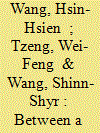

|
|
|
|
|
| Summary/Abstract |
In comparison to hegemony, lesser powers usually struggle for survival between two or more great powers under state power asymmetry, a perpetual phenomenon in international politics. With the rise of China and the increasingly strengthening role of the US in the Asia-Pacific region, it is important to learn how lesser powers manage their relations with the two. To explore this issue, we propose that the strength of state power will constrain the strategies of lesser powers as they choose between the US and China. Borrowing from existing theories and ideas on strategies that include balancing, bandwagoning, and hedging, we argue that the stronger a country’s power, the more likely it will choose a balancing strategy. At the same time, the weaker the country, the more likely that it will go with bandwagoning. Regional middle powers will show varied strategy choices, as they possess a higher degree of freedom in choosing which great power to side with. To validate these arguments, we construct two indicators — differences in trade dependence on the US and China and differences in the voting score consistent with the US and China — to quantify the strategies of lesser powers toward great powers and examine whether the variable of strategies follows the expected pattern. Our analysis shows that countries in the middle of the spectrum of state power demonstrated great freedom in choosing strategies toward the two powers.
|
|
|
|
|
|
|
|
|
|
|
|
|
|
|
|
| 4 |
ID:
192074
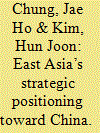

|
|
|
|
|
| Summary/Abstract |
Relatively few systematic and categorical studies have been conducted on the variant responses by East Asian states to the rise of China, and even fewer dealt with reasons for such intra-regional variations. This study seeks to fill the void by examining the strategic responses by 15 East Asian states for the period of 2011–2016. This period merits close scrutiny because China became more explicitly assertive. The research proceeds in two phases. First, by way of reading into the expert assessments in academic journals, the strategic responses of the 15 states are categorised into balancing, hedging, or bandwagoning. Second, statistical analyses are conducted to see how the intra-regional variations are related to unit-level factors. Of the seven variables analyzed, three – geographical proximity, democracy, and identity – turn out to be crucial in determining the East Asian states’ strategic responses.
|
|
|
|
|
|
|
|
|
|
|
|
|
|
|
|
| 5 |
ID:
141228
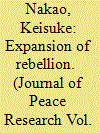

|
|
|
|
|
| Summary/Abstract |
Why do some rebellions expand gradually as rebel groups challenge in sequence, whereas other rebellions explode instantaneously as rebel groups challenge in unison? To address this question, we develop a dynamic and spatial model of rebellion that illustrates patterns of war fought between a hegemon (government) and its challengers (rebel groups). Our model incorporates three features into the standard coordination game: (a) potential rebel groups (players) are uncertain about the government’s strength; (b) battle outcomes are unpredictable; (c) these groups can be heterogeneous in terms of resolve and strength. In contrast to what existing theories commonly presume, our theory suggests that the sequence and timing of challenges are determined endogenously, depending on rebel groups’ resolve and strength. Through equilibrium analyses, we demonstrate that while simultaneous challenges are likely when rebel groups are relatively homogeneous, sequential challenges may emerge when one group is outstanding in terms of resolve and strength. Once this group rebels, other groups are inclined to ‘bandwagon’ as battles evolve, because the government is gradually revealed to be weak and because accumulated challenges shift the balance of power away from the government. Our theory also addresses why rebellious movements often spread across the periphery and can eventually reach the heartland as if a siege tightens. With an eye to historical incidents, we delineate four patterns of rebellion: (i) snowballing rebellion, which gradually escalates as more challengers are drawn in (Napoleonic Wars); (ii) catalytic rebellion, in which an instigator provokes a galvanizing event to inspire others to challenge the government (Boshin War); (iii) partially coordinated rebellion, which is initiated by a subset of ex post rebel groups (American Civil War, Yugoslav Wars); (iv) fully coordinated rebellion, in which all the rebel groups challenge collectively (American Revolution, Glorious Revolution).
|
|
|
|
|
|
|
|
|
|
|
|
|
|
|
|
| 6 |
ID:
122923
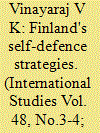

|
|
|
|
|
| Publication |
2011.
|
| Summary/Abstract |
The essay examines the threats and challenges that Finland has perceived first from imperial Russia, then from the Soviet Russia and now from the Russian Federation. Apart from studying the dynamics of Finland-Russia relations, it looks specifically at the Finnish responses for ensuring its sovereignty, independence and territorial integrity in general and the self-defence strategies adopted by Finland in dealing with potential threats from Russia in particular. This is done in the context of Paul Schroeder's categorization of self-defence strategies.
|
|
|
|
|
|
|
|
|
|
|
|
|
|
|
|
| 7 |
ID:
123108


|
|
|
|
|
| Publication |
2013.
|
| Summary/Abstract |
In the face of a rising China, some scholars have argued that ASEAN countries will choose to either bandwagon with or balance against China, while others believe they will respond with a more moderate policy known as 'hedging'. In considering these options, ASEAN countries must take into account their individual interests within the economic and security structure of this region. In this research, we argue that each ASEAN country confronts divergent sets of security and economic relations with China, which play a major role in shaping their policy responses. We can characterize their responses into four quadrants. Each cell can be categorized in terms of a high or low degree of threat perception (HT or LT) from China, as well as a positive or negative economic expectation (PE or NE) with China. We thus hypothesize that ASEAN countries in the HT-NE situation will balance against China; those in the LT-PE situation will bandwagon with China; those in the HT-PE or LT-NE situations will hedge against China. Hypotheses are supported by three case studies, Vietnam-China (HT-NE), Cambodia-China (LT-PE) and Singapore-China (HT-PE) relations.
|
|
|
|
|
|
|
|
|
|
|
|
|
|
|
|
| 8 |
ID:
141146
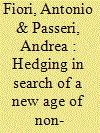

|
|
|
|
|
| Summary/Abstract |
This article, hence, aims to explore the nature and patters of this ongoing process of strategic repositioning put into practice by Myanmar within the political triangle with Washington and Beijing. Against this backdrop, we will draw upon the conceptualization of ‘hedging strategy’, which identifies a set of multidimensional ‘insurance policies’ adopted by small actors in their relations vis-à-vis great powers.
|
|
|
|
|
|
|
|
|
|
|
|
|
|
|
|
| 9 |
ID:
179036
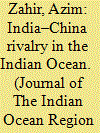

|
|
|
|
|
| Summary/Abstract |
After India's military intervention to thwart a coup in the Maldives in 1988, India had taken for granted its strategic relationship with the Maldives since the early 1990s. However, from around mid-2000s, Sino-Maldives linkages dramatically increased, threatening the Indo-Maldives strategic relationship. Yet, as a result of the growing Sino-Indian rivalry, Indo-Maldives strategic relations have also undergone substantive changes: from India as the de facto port of first call, to articulation of an ‘India First' policy in 2005, which then underwent substantiations, especially given China's Belt and Road Initiative, towards an ‘India dominated' strategic policy since late-2018. Consequently, even though Sino-Indian competition has provided significant economic opportunities to the Maldives, and the stability of the new Indo-Maldives strategic dynamic hinges on domestic factors, overall the Maldives’ foreign policy room for manoevre has been constrained. This case suggests that while external structural factors may not determine all foreign policy choices, they nevertheless significantly constrain the behavior of small states.
|
|
|
|
|
|
|
|
|
|
|
|
|
|
|
|
| 10 |
ID:
141270
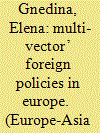

|
|
|
|
|
| Summary/Abstract |
The article examines the phenomenon of ‘multi-vector’ foreign policies that have been adopted by a variety of states in Russia and the EU common neighbourhood. It traces the origins of ‘multi-vector’ foreign policy to a series of asymmetric bargaining ‘games’ between smaller states and two competing regional powers over the terms of cooperation. During these bargaining games, they either accommodate the demands of more powerful actors to relieve external pressure, or manoeuvre between two external actors to extract concessions from and negotiate more favourable agreements with one or both. The model illustrating how ‘multi-vector’ states behave is tested in the case of Ukraine's energy policy in the period from 1999 to 2009.
|
|
|
|
|
|
|
|
|
|
|
|
|
|
|
|
| 11 |
ID:
187304


|
|
|
|
|
| Summary/Abstract |
Over the past few years, European security cooperation has been revived. The EU has launched several defence initiatives and some member states, such as France have launched their own collaborative initiatives. The renewed activism in European security cooperation followed several years of inactivity and warrants theoretical investigation. Hedging is a concept that has been employed to make sense of renewed activism in European security cooperation. By pursuing hedging, Europeans are preparing for a future in which the US might be unwilling or unable to get involved, and to assist with, European security affairs. Advancing a neorealist analysis, this article argues that European states’ efforts to increase cooperation remain consistent with the broader trajectory of European security cooperation since the end of the Cold War. European states remain dependent on the US for their security and are still far from autonomously projecting their influence internationally. This article illustrates the argument with reference to the recent withdrawal of the US from Afghanistan and the French promise to wind down its commitment in the Sahel. The implications of this argument are discussed in detail.
|
|
|
|
|
|
|
|
|
|
|
|
|
|
|
|
| 12 |
ID:
137463
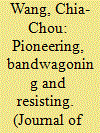

|
|
|
|
|
| Summary/Abstract |
This study determined the preferred strategies of provincial leaders when policies formulated by the central government jeopardized provincial interests, and investigated the extent to which these preferred strategies were reflected in actual actions. The theoretical preferred strategies were ascertained using rational choice institutionalism as a research approach, and an analytic framework was developed comprising three dimensions: (a) provincial government predictions of central government actions; (b) the terms of office of CPC provincial committee secretaries; and (c) the connections between CPC provincial committee secretaries and Hu Jintao. The results showed that the accuracy rate of the research framework to predict the actual actions of provinces was 54.8%. Using the proposed analytic framework can reduce prediction errors by 28.1%.
|
|
|
|
|
|
|
|
|
|
|
|
|
|
|
|
| 13 |
ID:
190970
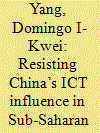

|
|
|
|
|
| Summary/Abstract |
In light of the increasingly pivotal role of Sub-Saharan Africa (SSA) in the escalating US-China competition, this paper explores why US-led anti-Chinese information and communications technology (ICT) campaigns have not resonated with African countries. It notes that Washington’s narrative about China’s ICT activities in the region corresponds with Stephen Walt’s “balance of threat,” emphasizing the threat of China and demanding that African states balance against its cyber aggression. It argues, however, that American policymakers should focus more on Randall Schweller’s “bandwagoning for profit” to resist China’s ICT influence in the region because the pitfalls of malignant Chinese ICTs are outweighed by the opportunities and prospects of mobile-driven digital transformation there. This paper explores Washington’s unsatisfactory approach toward the SSA, traces China’s long-term penetration into the digital sector among African countries, and argues that the country’s strategic objective in the region is to establish a digital ecosystem filled with Chinese technologies and devices. It then evaluates the region’s digital prospects and the yearning among African countries to learn from China’s late development path. The paper concludes that China is not winning hearts and minds in the region and both strategies of balancing and bandwagoning persist in Sino-African relations. African countries would not always bandwagon with China if there were more alternatives. To resist the country’s ICT influence in the region, Washington should engage with Africa’s ICT industries, deepen trade relations and help to grow its digital economy.
|
|
|
|
|
|
|
|
|
|
|
|
|
|
|
|
| 14 |
ID:
185152
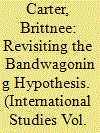

|
|
|
|
|
| Summary/Abstract |
Early theories of alliance formation often focus on when great power or status quo states will enter into military alliances. However, revisionist powers, seeking to threaten the international order igniting global security concerns, often draw power from their alliances with small regional neighbours and weak states. Though several studies discuss indicators that may potentially drive these weak states to bandwagon with revisionist powers to the detriment of protecting status quo security interests, many of these theories have yet to be tested empirically, let alone be presented and tested within the same study. This research empirically tests the conditions under which weak states will form bandwagoning alliances with aggressor states. The results demonstrate that weak states will form bandwagoning alliances with neighbouring regional aggressors, when facing an external threat, and especially under conditions of internal duress or domestic political strife. In order to protect global security interests and to keep aggressor and revisionist states from gaining power and influence through bandwagoning alliances, status quo states should identify internally destabilized weak states and offer early assistance in state building and increasing bureaucratic capacity.
|
|
|
|
|
|
|
|
|
|
|
|
|
|
|
|
| 15 |
ID:
185985
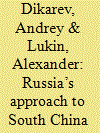

|
|
|
|
|
| Summary/Abstract |
The territorial dispute in the South China Sea (SCS) affecting China and several ASEAN countries has already resulted in drawn-out political tensions in the region. However, one aspect of the dispute is rarely discussed: its influence on Sino-Russian relations and its possible role as a case study in analysing the character of these relations. While Russia moves closer to China in the dispute it still refrains from support of its territorial claims and develops close relations with some of China’s regional opponents such as Vietnam and India. This article describes most recent Russian economic and political activity in the region involving these countries with the aim of clarifying whether the Russian approach to problems in the SCS can be understood as an attempt to balance, bandwagon or hedge against growing Chinese influence, or whether Moscow’s approach is guided by different considerations.
|
|
|
|
|
|
|
|
|
|
|
|
|
|
|
|
| 16 |
ID:
152093
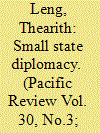

|
|
|
|
|
| Summary/Abstract |
Cambodia's foreign policy behavior towards Vietnam can be characterized as using a strategy of ‘hedging’, whose nature is different from the one suggested in the existing literature. Such a strategy can be discerned from Cambodia's omni-directional policy responses, ranging from economic pragmatism, limited bandwagoning, binding engagement and soft-balancing. Furthermore, the case of Cambodia's foreign policy towards Vietnam suggests that non-state actors, such as the opposition party and the population (voters) play a significant role in shaping the state's foreign policy, even though it is formed under the authoritarian ruling party. This study also suggests that the foreign policy decisions of an authoritarian state are not solely shaped by the personal attributes of their leader.
|
|
|
|
|
|
|
|
|
|
|
|
|
|
|
|
|
|
|
|
|